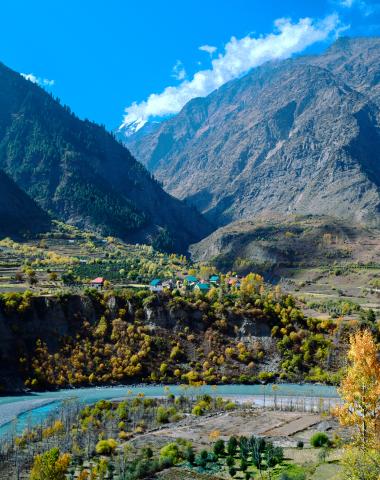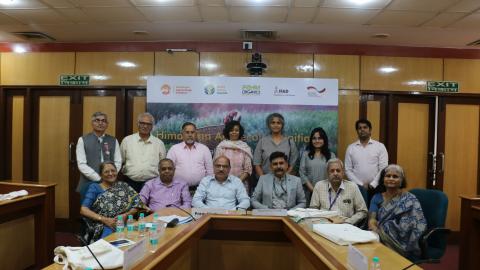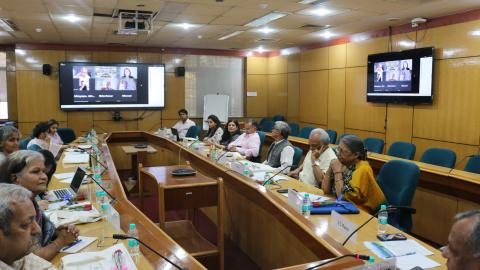The Alliance of Bioversity International and CIAT organised the second Scientific Committee meeting of the Himalayan Agroecology Initiative (HAI). This international initiative aims to improve livelihoods and sustainability in the Himalayan region focusing on India, Bhutan and Nepal. HAI applies a food systems approach for developing agroecology roadmaps.
HAI is funded by the Special Initiative Transformation of Agricultural and Food Systems of the German Federal Ministry for Economic Cooperation and Development (BMZ) and the International Fund for Agricultural Development (IFAD), and coordinated by the World Future Council (WFC) and IFOAM – Organics International, with cooperation from governments and various stakeholders. In India, the Alliance of Bioversity International and CIAT act is the coordinating agency.
The meeting aimed to update members on the progress made since the first meeting: review the updated roadmap draft - especially policies supporting agroecology at national and state levels - and discuss SMART objectives for each of the seven strategic pillars, including outcomes, actions, and indicators.
Dr. Prem Mathur, Technical Advisor from the Alliance, summarised the previous meeting's outcomes and highlighted agroecology's importance for Himalayan states. He also outlined the roadmap guidelines, expected timeframe, and the proposed activities for finalising the roadmap.
Dr. Ishwari Bisht, Consultant at the Alliance, presented an assessment of nearly 120 national and state-level policies relevant to HAI, highlighting their merits and demerits with respect to agroecology. He emphasised that the roadmap will be tailored to the unique needs of Himalayan states, which could also serve as a vital starting point for the overall food system transformation needed and scaling up agroecology across the country.
Dr. Malavika Dadlani, National Coordinator of HAI, presented guiding principles for roadmap development based on seven strategic pillars: food systems governance; ensuring access to land, water, and healthy soils; rebuilding climate-resilient healthy agro-ecosystems; promotion of sufficient healthy and sustainable diets for all; building fairer, shorter, and cleaner supply chains; reducing food loss and waste; and putting trade in the service of sustainable development.
Dr. Jai C. Rana, India Country Representative at the Alliance, shared insights from a regional workshop in Nepal on March 26-27, 2025 organised by ICIMOD. The workshop aimed to promote agroecology for resilient and sustainable mountain food systems. Dr. Rana emphasised that the Himalayan Agroecology Roadmaps should address issues and challenges that are key to the entire Hindu Kush Himalayan Region.
Dr. S.K. Sharma, former Director of NBPGR and former Vice-Chancellor of Himachal Pradesh Agriculture University, highlighted the need for enhancing transport infrastructure and increasing gender sensitivity in the roadmap, noting women's significant involvement in agricultural activities in Himalayan states.
Dr. Rajeshwar S. Chandel, Vice Chancellor of Dr. YS Parmar University, Solan, recommended identifying scalable best practices and aligning them with HAI's objectives.
The meeting ended with feedback on the roadmap and a proposal for a focused group workshop to finalise the roadmap document.
The Himalayan Agroecology Initiative is a strategic effort aimed at fostering sustainable food systems in India, Nepal, and Bhutan. Working closely with governments and a broad range of stakeholders, the initiative supports the emergence of multi-stakeholder processes that develop, build capacities and facilitate the implementation of agroecology roadmaps that empower farmers and key players to better benefit from public policies, including those supporting organic agriculture, food processing, marketing, distribution and consumption. Together with the World Future Council and IFOAM – Organics International, renowned organizations are paving the way for this ambitious undertaking at the national level, including the Alliance of Bioversity International and CIAT and the United Nations Development Programme (UNDP) in India, Local Initiatives for Biodiversity, Research and Development (LI-BIRD) in Nepal and the Tarayana Foundation in Bhutan. This effort contributes to the German-Indian Lighthouse Initiative for Agroecology and Sustainable Resource Management and is funded by the Special Initiative Transformation of Agricultural and Food Systems of the Federal Ministry for Economic Cooperation and Development (BMZ) and the International Fund for Agricultural Development (IFAD), which both are core partners.




